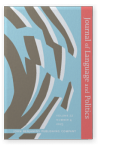Vol. 22:4 (2023) ► pp.415–437
Discourses and practices of the ‘New Normal’
Towards an interdisciplinary research agenda on crisis and the normalization of anti- and post‑democratic action
This position paper argues for an interdisciplinary agenda relating crises to on-going processes of normalization of anti- and post-democratic action. We call for exploring theoretically and empirically the ‘new normal’ logic introduced into public imagination on the back of various crises, including the recent ‘Refugee Crisis’ in Europe, COVID-19 pandemic, or the still ongoing Russian invasion of Ukraine. Gathering researchers of populism, extremism, discrimination, and other formats of anti- and post-democratic action, we propose investigating how, why, and under which conditions, discourses and practices underlying normalization processes re-emerge to challenge the liberal democratic order. We argue exploring the multiple variants of ‘the new normal’ related to crises, historically and more recently. We are interested in how and why these open pathways for politics of exclusion, inequality, xenophobia and other patterns of anti- and post-democratic action while deepening polarization and radicalization of society as well as propelling far-right politics and ideologies.
Article outline
- 1.Introduction
- 2.Scope/Focus of the suggested research agenda
- 3.On the conceptual connection between crisis, normalization and anti- & post-democratic action
- 4.Theoretical and conceptual contribution
- 5.(Final) methodological considerations – connecting discourse to practice
-
References
For any use beyond this license, please contact the publisher at [email protected].
